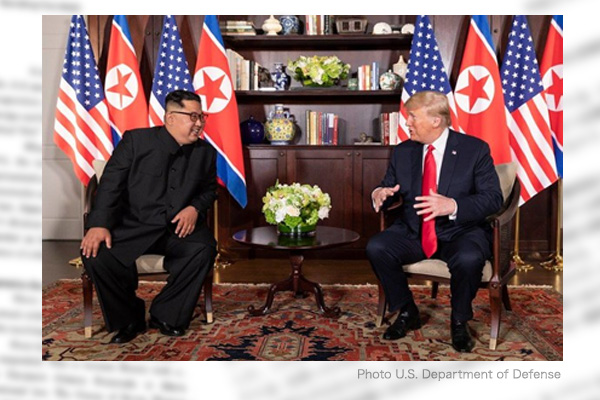June 12 marks the first anniversary of the unprecedented U.S.-North Korea summit. While the results of the summit came under fire from various quarters at the time, I gave positive assessment to the United States’ policy of refraining from making any easy concession. I think that my assessment has generally proven right.
Easy concessions excluded from the U.S.-North Korea talks
Just after the first-ever summit, many pundits criticized U.S. President Donald Trump for guaranteeing the survival of North Korea’s grotesque dictatorship. I countered: “The joint statement includes not regime guarantees but security guarantees. In return for the guarantees, President Trump won North Korean leader Kim Jong Un’s commitment to complete denuclearization. The statement thus stipulated a denuclearization-for-security deal.”
President Trump was also criticized for being deceived by Mr. Kim’s commitment to the denuclearization of the Korean Peninsula rather than North Korea. Earlier, North Korea had asserted that the Korean Peninsula denuclearization should include an inspection on U.S. bases in South Korea and a ban on any approach to the peninsula by U.S. strategic forces including B-1B bombers, aircraft carriers and nuclear-powered submarines.
At working-level talks and the second U.S.-North Korea summit in Hanoi in February 2019, however, the North Koreans refrained from making such assertion. The U. S. has maintained a stance that the denuclearization of the Korean Peninsula is the same as that of North Korea now that the U. S. has removed nuclear weapons from South Korea.
The first summit also led to concern that the U. S. might declare the end of war with North Korea and proceed to the withdrawal of U.S. forces from South Korea in exchange for Pyongyang’s dismantlement of intercontinental ballistic missiles reaching the U.S. mainland. Some condemned President Trump for leaving North Korea’s human rights abuse untouched. At the second summit, however, President Trump asked Pyongyang to dismantle all ballistic missiles as well as biological and chemical weapons and tackle human rights problems including its abduction of Japanese citizens, as confirmed by senior U.S. officials.
Japan-U.S. unity remains unshaken
“Time is on our side,” a Trump administration official said, indicating that the administration is confident that economic sanctions have been considerably effective. Since last October, North Korea has stopped mentioning the declaration of an end to the Korean War but reiterated a call for the relaxation of economic sanctions.
One year ago, Japanese Prime Minister Shinzo Abe assessed that the first U.S.-North Korea summit was significant as President Trump conveyed Japan’s stance on the abduction issue to Mr. Kim personally and won the North Korean leader’s written commitment to denuclearization. Japan and the U. S. have been united to retain economic sanctions and refrain from providing financial assistance until North Korea implements its complete denuclearization and the return of all Japanese abductees.
Mr. Kim humiliated himself in Hanoi because of his wrong prediction that President Trump might make easy concessions. If Mr. Kim were to reconstruct the collapsed North Korean economy, he would have no choice but to meet the conditions set by Japan and the United States
Prime Minister Abe said that he hoped that Mr. Kim would be a leader who can make a flexible, strategic decision on what would be the best for his country. The current focus of attention is whether Mr. Kim would make decisions as hoped by Mr. Abe or continue to seclude himself while hoping to see President Trump failing to be reelected in November 2020.
Tsutomu Nishioka is a senior fellow and a Planning Committee member at the Japan Institute for National Fundamentals and a visiting professor at Reitaku University. He covers South and North Koreas.


